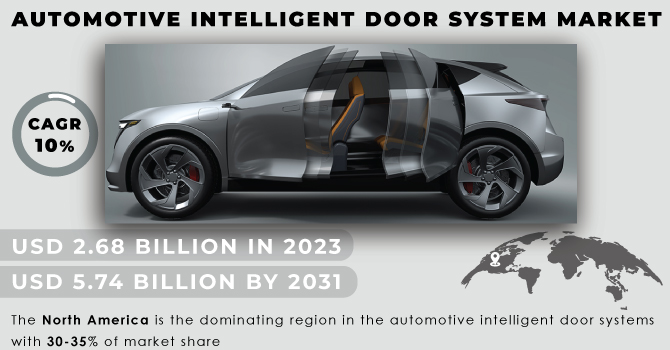
The Automotive Intelligent Door System Market, valued at USD 2.68 Billion in 2023, is projected to reach a staggering USD 5.74 Billion by 2031. This translates to a compound annual growth rate (CAGR) of 10% throughout the forecast period from 2024 to 2031.
Fueled by surging consumer preference for comfort, safety, and advanced technologies, the Automotive Intelligent Door System Market is poised for significant growth. These systems enhance the driving experience through automatic operation, improved security, and convenience features like hands-free access and power-sliding doors.

Automotive Intelligent Door System Market
Get a Free Sample PDF Copy of the Latest Research @ https://www.snsinsider.com/sample-request/2260
The Automotive Industry Is Witnessing A Paradigm Shift Towards Intelligent Technology
Intelligent door systems replace traditional car doors with an automated system that utilizes sensors and internet-of-things (IoT) capabilities. This technology facilitates automatic opening and closing of doors, enhancing convenience and catering to the growing demand for connected and luxury vehicles. Safety regulations are becoming stricter globally, mandating the inclusion of advanced features like intelligent door systems in cars. Additionally, the rise of autonomous vehicles and the cost-effectiveness of these systems are propelling market expansion. Furthermore, the increasing adoption of electric vehicles and advanced driver-assistance systems (ADAS) is acting as a major growth driver for the market.
Market Key Players
-Johnson Electric (Hong Kong)
-Brose Fahrzeugteile GmbH & Co. KG (Germany)
-Continental AG (Germany)
-Huf Hülsbeck & Fürst GmbH & Co. KG (Germany)
-Kiekert AG (Germany)
-SMARTRAC N.V. (Amsterdam)
-WITTE Automotive (Germany)
Convenience Meets Safety in Modern Cars
Modern drivers crave technology that elevates both safety and comfort. Features like lane departure warnings, blind-spot detection, and auto-braking are becoming commonplace, extending to infotainment systems and adaptive cruise control. Now, innovative intelligent door systems join the ranks, offering automatic operation, improved security, and a significantly more convenient driving experience.
The rising popularity of connected, self-driving cars with advanced safety features necessitates secure and intelligent door systems. Additionally, the growth of the luxury car segment, known for offering advanced features for comfort and convenience, presents an ideal market for intelligent door systems. As technology advances, intelligent door systems could become more affordable, broadening their market reach.
Segment Analysis
Technology Type:
Power Sliding Door System: This dominant sub-segment accounts for 50-55% of the market share. Power sliding doors offer convenience and ease of access, making them popular in minivans, SUVs, and some luxury cars.
Vehicle Type:
Passenger Cars: This segment holds the largest market share (65-70%) due to the sheer volume of passenger car sales globally. The growing focus on comfort and safety features in passenger cars is driving the adoption of intelligent door systems.
Sales Channel:
OEM (Original Equipment Manufacturer): This dominant sub-segment (80-85% market share) reflects the fact that intelligent door systems are typically pre-integrated into vehicles during manufacturing, ensuring compatibility and optimal performance within the car’s safety and convenience features.
Enquiry or Share Your Questions If Any Before Purchasing This Report @ https://www.snsinsider.com/enquiry/2260
Impact of Russia-Ukraine War on the Automotive Intelligent Door System Market
Russia and Ukraine are key players in the neon gas industry, a crucial component for chip production in intelligent door systems. Sanctions and limited supplies are forcing manufacturers to find alternatives, leading to potential delays and a projected 15-20% price increase for these essential components. This coincides with the war worsening the global chip shortage, impacting car production by an estimated 5-10%. This translates to a decline in demand for intelligent door systems, often found in higher-end vehicles with lower production volumes. The war’s uncertainty may prompt car manufacturers to diversify their supplier base, potentially creating new opportunities in the long run, but causing short-term hiccups as new suppliers are established.
Impact of Economic Slowdown on the Automotive Intelligent Door System Market
Consumer spending becomes more cautious, potentially leading to a 5-10% decline in car sales, especially impacting higher-end vehicles that often feature intelligent door systems. This directly translates to a decrease in demand for the technology. Economic uncertainty can also lead car manufacturers to delay investments in new technologies by 10-15%, potentially impacting research and development for intelligent door systems. During downturns, car buyers prioritize affordability, prompting automakers to offer vehicles without these advanced features to stay competitive.
The North American region dominates in the automotive intelligent door system market, capturing a commanding 30-35% market share
North America boasts a well-established and advanced automotive industry that prioritizes the integration of cutting-edge safety features (ADAS) and intelligent technologies.
Stringent regulations mandating ADAS features, often including intelligent door systems, contribute to North America’s market leadership.
The Asia Pacific region exhibits the fastest growth rate, projected to reach 12-15% annually
Asia Pacific is witnessing a significant rise in passenger and commercial vehicle production, creating a larger market base for intelligent door systems.
As disposable income levels rise in the region, consumers are increasingly prioritizing safety features in their vehicles, driving demand for intelligent door systems.
Government initiatives promoting the adoption of ADAS features, which often include intelligent door systems, are further accelerating market growth in the Asia Pacific region.
Key Takeaways from the Automotive Intelligent Door System Market Study
- Gain insights into the major factors propelling the automotive intelligent door system market, including the rising demand for convenience, safety features, connected cars, and autonomous vehicles.
- Explore a comprehensive analysis of the market segmented by technology type, vehicle type, and sales channel, enabling you to identify the most promising areas for investment.
- Become aware of the potential challenges posed by global disruptions and economic slowdowns, along with strategies to mitigate these risks.
- Understand the dominance of North America and Europe, alongside the high-growth potential of the Asia Pacific region.
Recent Developments
April 2024: In a move to compete with Mahindra Thar’s upcoming five-door version, Force Motors unveiled a refreshed Gurkha series featuring a five-door model. The new Gurkha boasts a modernized cabin with a digital instrument cluster and a larger infotainment screen. Expect subtle design tweaks like a stretched wheelbase to accommodate the extra doors and new alloy wheels.
December 2023: Tesla announced a complete redesign of its iconic Roadster. This all-new electric two-door coupe features a sleek aerodynamic design, a rumored four-seater layout, and a sportier look with 19-inch wheels, exceeding the original’s style and performance.
Buy Now This Complete Research Report at Discounted Price @ https://www.snsinsider.com/discount/2260
Our Related Report


